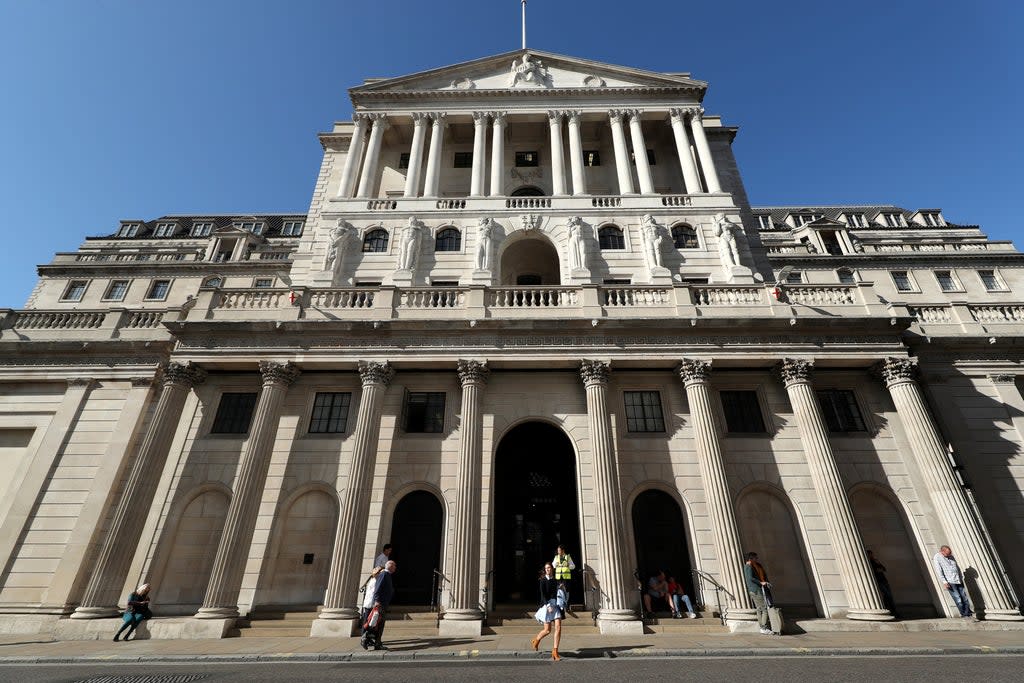Voices: Lay off the Bank of England – Tory attacks on this institution should worry us all

It shouldn’t be all that surprising that the Tory government – at cabinet level, according to the reports – is taking shots at the Bank of England. Casting about for other people to blame is one of the defining characteristics of Boris Johnson’s dismal administration.
“Always remember that it was the other guy’s fault,” in lurid pink letters, is probably framed above the desk of every serving minister. I’m not sure about the font. Comic sans?
It’s taken them a while to fully turn their guns on Threadneedle Street, even though control of inflation is the job of the Bank’s Monetary Policy Committee (MPC) and inflation is jumping up like a superpowered grasshopper with a predator in hot pursuit.
The MPC’s problem is that there is precious little it can do about the chief drivers of the current surge. About 80 per cent of the power in the grasshopper’s legs is down to energy and tradeable goods, which the Bank has about as much power to influence as it does tomorrow’s Wordle.
By contrast, there are all sorts of things the government could do to mitigate the impact. It just doesn’t want to. At least, not with a General Election still two and a half years away. So ministers and Tory MPs have turned on the Bank. Deflect! Distract!
This led to headlines over the weekend about the Bank’s independence being under threat. While they came from unnamed sources, and were swiftly rowed back on, these reports don’t emerge in a vacuum, and there have been plenty of backbench yahoos lining up in support.
The government seems to have no guiding principle beyond preserving the position of BoJo the “big dog” in Downing Street, and has been busy wiping its a*** on the constitution and just about every British institution you could name. But threatening the Bank’s independence represents a new low.
True, it’s not as cruel as packing off asylum seekers to Rwanda, but it rivals the latter in terms of stupidity.
Scrapping it would undermine a mechanism that has greatly contributed to the UK’s economic and price stability, scare the life out of the investors, both domestic and foreign, and confirm to those made jittery by the government’s destructive behaviour that it has completely lost the plot.
Gordon Brown’s decision to hand off control of interest rates to the MPC, which wasn’t in Labour’s manifesto ahead of its crushing 1997 victory, created some muttering on the left as well as the right at the time. But it was one of the better decisions made by a British chancellor in the modern era.
Prior to that, rates were under political control and moved in response to political priorities, regardless of the impact on the economy. No chancellor, for example, would countenance an increase on the eve of an election, even with inflation positively popping as it is today.
This bred instability and greatly contributed to a couple of searingly nasty recessions which Britain endured under medium-competent Tory cabinets.
Just imagine this lot – who look like a bunch of rejects from early editions of The Muppet Show when compared to administrations of the Eighties and even the Nineties – with their hands on the interest-rate tiller. Britain would be on the fast track to banana republic status, but with a lot less sunshine.
Mel Stride, the chair of the Treasury committee, moved to join the bash-the-Bank party by playing the role of Captain Hindsight with Andrew Bailey and the other MPC members over their decision-making at a hearing on rates.
He was told in no uncertain terms by the members who voted for a tougher half-point – rather than quarter-point – rise in rates at the last MPC meeting that it would only have had a marginal impact on the expected double-figure inflation we have coming. We also shouldn’t forget that the economy is rapidly catching a case of stealth Omicron, and a harder line on rate rises (and more are coming, you can count on that) would only add to its severity.
Stride could (and did) justifiably chuck bricks at the Bank’s forecasting, which has proved to be about as useful as one of BoJo’s failed bridge projects. But its pointy heads are in a crowded field. Economic forecasters are a bit like £100m strikers who find it easier to hit the corner flag than the back of the net, only to get re-signed at the transfer deadline on higher wages.
All of this was rather overshadowed by governor Andrew Bailey’s comments.
To keep up to speed with all the latest opinions and comment, sign up to our free weekly Voices Dispatches newsletter by clicking here
Sometimes he does rather seem to feel an irresistible urge to put his exquisitely shoed feet into his mouth. Here’s one for him to have printed in pink Comic Sans for the purposes of framing: when you earn half a million quid, it ill behoves you to warn people off seeking a pay rise with inflation approaching double figures.
Talking about “apocalyptic” food price rises was also questionable. But maybe he was right to say that. Combined with rising energy prices – and OfGem’s crazy proposals to impose a midwinter price rise – apocalyptic is an apt description of the effect this is going to have on people who probably won’t earn Bailey’s salary.
After all this had been covered, Stride rightly recognised the value in the Bank’s independence – because setting interest rates is not a job that should be in politicians’ hands. History has definitely proved that it is something they can only make a mess of.
When it comes to addressing the impact of inflation, they’ve been proving that getting back to the office hasn’t done much to enhance ministerial productivity when it comes to the issues that count. And that is where the real problem lies.

